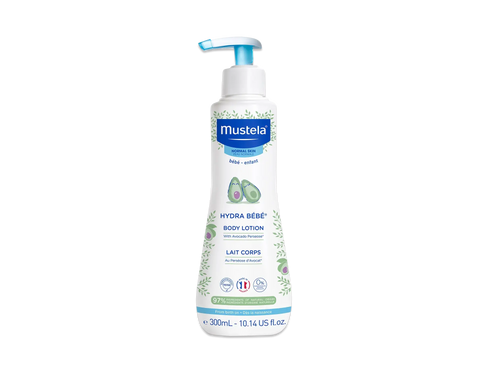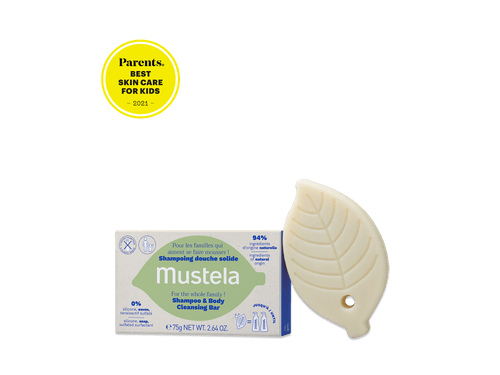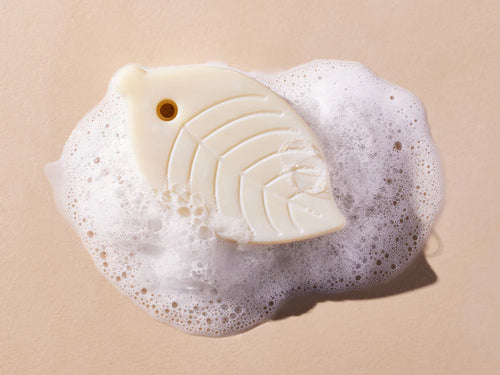Fever, fussiness, and a runny nose. Is your little one sick with a cold or the flu? Even for the most seasoned parent, it can be hard to tell! You’ll need to be on the lookout for baby flu symptoms.
The flu in infants can be more serious than it is for older kids or for you as an adult. That’s why it’s important to know when to take your little one to the doctor and what you can do to care for your sick baby.
We’ll cover that in this article!
First, we’ll do a quick refresher course on what the flu is. Then we’ll go over symptoms as well as several tips for preventing the flu and keeping your little one comfortable if they’ve already come down with it.
What Is The Flu?
The flu is a contagious virus that’s passed from person to person. Anyone can catch it — old, young, and everyone in-between. While most people recover from the flu within a week, the elderly and children under two years old are more likely to develop complications.
This virus affects the respiratory tract (nose, throat, and lungs) and can lead to infections like pneumonia, croup, and bronchiolitis.
How can you know if your baby has the flu? Sometimes it’s difficult to tell. Let’s look at some common flu symptoms in babies.
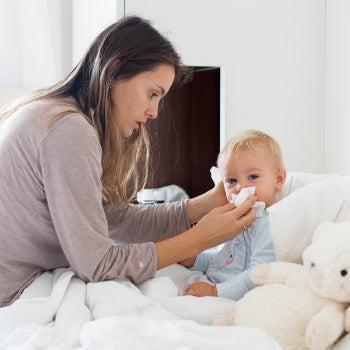
Flu Symptoms In Babies
If you’ve had the flu, you might be familiar with some of the symptoms — and you’ll know that it’s no fun at all!
Flu symptoms can vary a bit for each person, but these are the common symptoms for babies and toddlers:
- Fever
- Runny nose
- Cough (babies younger than six months are less likely to have a cough)
- Change in eating habits
- Fussiness
- Upset stomach, diarrhea, and vomiting
- Chills
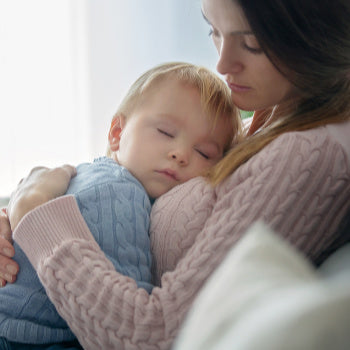
These are the common signs that your baby has the flu. However, your baby can still have the flu even if they don’t show every symptom listed above. For example, some babies with the flu will have a fever but no other signs.
Headache and body aches often accompany the flu, as well. But, since your baby can’t tell you what hurts or how they feel, you might only see the other, noticeable symptoms.
When To Go To The Doctor
Since the flu can be serious for babies, it’s best to call your doctor if you think your little one has it. Keeping your pediatrician in the loop is especially important if your baby has a preexisting condition or a weak immune system.
Your doctor can tell you what to expect and let you know if you should bring your baby into the office or wait it out at home.

In addition, call or go to the doctor immediately if your baby has trouble breathing, is dehydrated (check for enough wet diapers), vomits for several hours, or feels better and then has more symptoms.
Finally, always call your doctor if your baby is under three months old and develops a fever.
Tips To Kick Baby Flu To The Curb
Of course, keeping the flu away entirely is ideal! First, we’ll talk about two ways to prevent the flu, and then we’ll offer six tips to help your baby recover if they have the flu.
2 Ways To Prevent The Flu
Vaccinate Your Family
The flu vaccine is one of the best ways to lower your child’s chances of coming down with the flu! According to the CDC, studies show that with the flu vaccine, the risk is lowered by 40% to 60%.
The only problem is that the vaccine isn’t approved for infants under six months. However, you and your other children can get the flu vaccine to protect yourself as well as your unvaccinated infant.
Plus, did you know that pregnant moms can get the flu vaccine? If you’ve got a bun in the oven, getting the flu vaccine will also provide your baby with some protection against the flu.
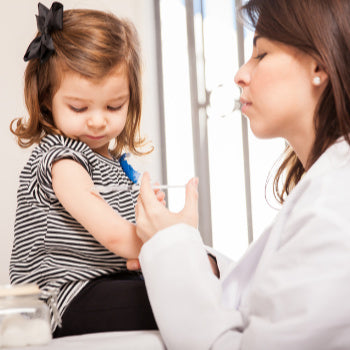
Wash Your Hands
The flu virus is easily passed from person to person — exactly what you don’t want if you’re trying to keep it away from your family! To avoid the spread of these unwanted germs, wash your hands frequently and teach your kids to do the same.
Get into the habit of washing your hands after changing your baby’s diaper, after using the restroom, and before preparing food.
When teaching your child good hand hygiene, remind them to wash up after playing outside or with pets, before eating, after school, and after pottying.
When your little one is still a baby, you’ll need to wash their hands for them and then show them the ropes as they get older. Put soap on your baby’s hands and scrub-a-dub for 20 seconds before rinsing them off with warm water.
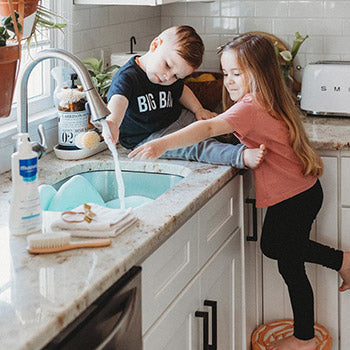
If you’re in a pinch without soap and running water, clean your baby’s hands with a wipe to tide them over until you can get to a sink.
Mustela’s Certified Organic Water Wipes with Cotton and Aloe are gentle on your baby’s delicate skin, making them great for wiping dirty bottoms as well as cleaning your baby’s face and hands.
Composed of 97% plant-based ingredients, these fragrance-free wipes will moisturize your baby’s skin and leave it feeling soft and comfortable. Plus, they’re great for babies with eczema-prone skin!
6 Tips To Help Your Baby Recover From The Flu
Unfortunately, there is no magic potion to make the flu go away. As long as your pediatrician tells you to keep your little one at home while they ride out the flu, your job is to make your baby as comfortable as possible.
Here are a few ways to ease your baby’s flu symptoms and help their body recover!
1) Offer Extra Fluids
The flu often causes dehydration. Help keep your baby hydrated by offering plenty of extra fluids. For babies that are still only breastfeeding, this simply means continuing to breastfeed.
If your baby is on solid foods, get creative when it comes to extra fluids! Try diluted juice, warm apple juice, water, yogurt, popsicles, or an electrolyte solution.
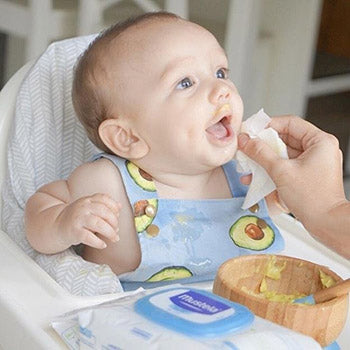
2) Use A Bulb Syringe
If your baby has a runny nose, suctioning it with a bulb syringe may provide some relief and help them breathe more easily.
Simply squeeze the air out of the bulb syringe, then put the tip of the syringe into your baby’s nose while maintaining pressure on the bulb. As you release the bulb, it will suction the mucus.
Remove the syringe, squeeze the boogies into a napkin, and repeat the process on the other side.
3) Run A Humidifier
Another way to provide relief for your baby’s runny nose is to use a humidifier to pump moisture into the air. Moist air can also help calm your little one’s cough.
Run a cool-mist humidifier in your baby’s nursery at night or in another room during the day.
4) Give Your Baby A Bath
Little ones can be quite fussy and irritable when they have the flu. We get it! The flu is no fun.
While you should let your baby rest, it also doesn’t hurt to distract them with an activity they enjoy. If your little one likes taking baths, put them in the tub for some splashy fun.
Make bath time both fun and good for their skin with Mustela’s Multi-Sensory Bubble Bath!
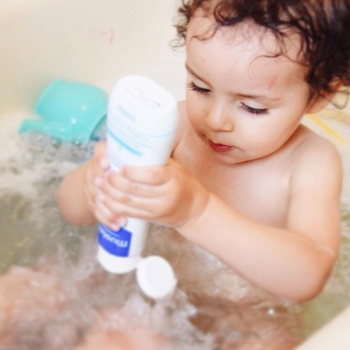
Our baby bubble bath formula is made with marine extracts to help maintain the skin's water balance, cornflower extract to soften skin, and our signature Avocado Perseose to help protect and hydrate.
Plus, it’s paraben-free and hypoallergenic!
5) Lower Your Baby’s Fever With Medicine
A fever is one of the ways that the body fights off infection or an illness like the flu!
But if the fever gets too high or your baby seems very uncomfortable, it might be time for acetaminophen or ibuprofen. (Keep in mind that babies under six months shouldn’t take ibuprofen.)
Always ask your doctor if you should give medicine to your feverish child and if your baby is old enough to take it. If you do give your little one a spoonful of medicine, make sure you’re giving them the right dosage!
One more note before moving on from the subject of medicine: never give your baby or small child aspirin, as it can cause Reye’s syndrome, which is very dangerous.
6) Give Your Baby Rest And TLC
Last, but certainly not least, your baby will need lots of rest while their body is fighting the flu. Spend time cuddling, talking or singing, and reading books. A little bit of rest and extra TLC can go a long way!
Fight The Baby Flu One Snuggle At A Time
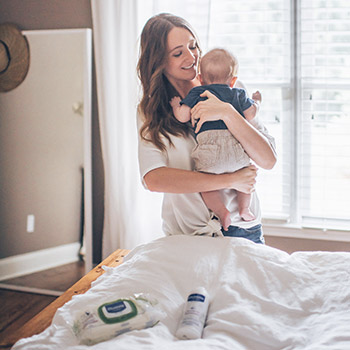
Since babies can easily develop complications from illness, it’s important to keep a close eye on them when they have the flu. Watch for the common baby flu symptoms and call your pediatrician if you think your little one is sick with this virus.
Take care of your sick little one at home by offering plenty of fluids, relieving their runny nose and cough, and distracting them with a bubble bath or other fun activity.
And, of course, don’t forget to give them lots of love and snuggles!



